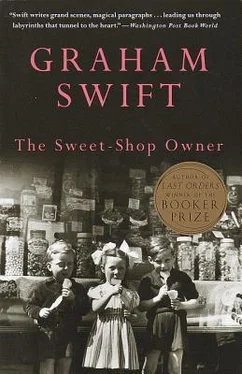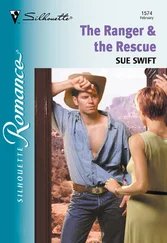Graham Swift - The Sweet-Shop Owner
Здесь есть возможность читать онлайн «Graham Swift - The Sweet-Shop Owner» весь текст электронной книги совершенно бесплатно (целиком полную версию без сокращений). В некоторых случаях можно слушать аудио, скачать через торрент в формате fb2 и присутствует краткое содержание. Год выпуска: 2012, Издательство: Vintage Books USA, Жанр: Современная проза, на английском языке. Описание произведения, (предисловие) а так же отзывы посетителей доступны на портале библиотеки ЛибКат.
- Название:The Sweet-Shop Owner
- Автор:
- Издательство:Vintage Books USA
- Жанр:
- Год:2012
- ISBN:нет данных
- Рейтинг книги:4 / 5. Голосов: 1
-
Избранное:Добавить в избранное
- Отзывы:
-
Ваша оценка:
- 80
- 1
- 2
- 3
- 4
- 5
The Sweet-Shop Owner: краткое содержание, описание и аннотация
Предлагаем к чтению аннотацию, описание, краткое содержание или предисловие (зависит от того, что написал сам автор книги «The Sweet-Shop Owner»). Если вы не нашли необходимую информацию о книге — напишите в комментариях, мы постараемся отыскать её.
The Sweet-Shop Owner — читать онлайн бесплатно полную книгу (весь текст) целиком
Ниже представлен текст книги, разбитый по страницам. Система сохранения места последней прочитанной страницы, позволяет с удобством читать онлайн бесплатно книгу «The Sweet-Shop Owner», без необходимости каждый раз заново искать на чём Вы остановились. Поставьте закладку, и сможете в любой момент перейти на страницу, на которой закончили чтение.
Интервал:
Закладка:
Your cheeks burned. There was that little hard furrow in your brow. You looked at me, to test me.
‘Dorry, don’t upset your mother,’ I said. And I knew that would send you up out of your chair, out of the door (how many times did we hear that door slam behind you after something she’d said or I’d said, or something we hadn’t said?), up the stairs, your steps heavy on the landing, into the refuge of your bedroom.
And I knew it would make me come up to you to make my truce.
‘Why does she do it?’ she said, her gasps subsiding, ‘Why does she do it?’ She sat with her elbows on the table, her own plate pushed away. She put the napkin which you’d dropped back in its silver ring. ‘She’ll do something stupid one of these days, don’t you think Willy?’ She got up, moved to her seat by the window and looked at the headlines on the papers. Then she said at last, searching my face: ‘All right, go to her.’
There were pictures of Kennedy over your bed. Photographs out of Time and Life and the Illustrated London News which I got from the shop. Kennedy in Vienna. Kennedy beneath the white statue of Lincoln. Other girls pinned up the grinning faces of pop-stars: Billy Fury, Adam Faith; centre-spreads from the fan magazines I sold. Too simple and trivial for you, Dorry?
‘She didn’t mean to be unkind.’
You lay with your head pressed to the pillow, to hide your tears.
‘She’s ill, remember.’
But you didn’t answer.
Then you turned at last.
‘You always take her side.’
‘It’s not like that. There aren’t “sides”. It’s not a fight.’
‘Isn’t it?’
You fell back again on the pillow. Your left leg, in a white school sock, swung over the edge of the bed; a silvery down at the knee. How still that room was, how familiar. Yet it would become soon ‘your’ room exclusively; the room of a young woman, at which I would pause and knock before entering.
I stroked your shoulder.
‘Don’t make an enemy of her, Dorry.’
You looked at me as if I’d already been defeated.
‘What does she want?’
‘I think what she wants is peace.’
22
The Saturday crowds in the High Street grew bigger and bigger. They bobbed like figures carried in water past the cluttered port-hole of the shop window. Eighteen, nineteen pounds a day. And was it just my imagination or were there more youngsters among those crowds, with money to spend and little looks, as they walked, of arrogance and temerity? They drew out notes from their pockets to buy clothes that were made solely for them. Blue jeans that hugged their hips; skirts that got shorter and shorter. I saw them look at me across the counter as if I’d never been young. And was there really once a William Chapman, aged eighteen or nineteen, who’d taken the tram every morning to work, dressed in a grey waistcoat and a stiff collar, as if he were already old?
‘You’ve got competition, old man,’ said Hancock. There were creases under his eyes and his movements had lost their athlete’s jauntiness, but he still wore the air — with that crisp, thick-striped shirt, those long side-burns and the way he lit his cigar, in the shop now, not waiting till he had gone, peeling off the roll of cellophane and crushing it in his hand — of a contestant anxious to prove he can win.
‘It’s not on my books, but that site opposite Samuel Road — going to be a newsagent’s. One of those groups.’
His brown eyes gave a little dart as he crackled the cellophane.
‘Thought you should know. Not so hot for the one-man business, is it, these days?’
But as if I cared. Competition? Had I ever competed? The shop was a gift, I’d got it for nothing. Rivals didn’t bother me. (Besides, I saw it when it opened that October: a clean, functional establishment; swing glass doors, stainless steel, rubber matting by the entrance, and a staff that changed every six weeks. Magazines spread loosely to look more numerous than they were, a mere sampling of sweets: no toys. And after a year it closed.)
‘They’re the newcomers,’ I said. ‘It’s me they’ll have to compete with.’
‘That’s the style.’ Hancock’s eyes narrowed concedingly as if they’d really hoped for some expression of dismay.
‘While we’re on the subject’ — he removed the cigar, still unlit, from his mouth — ‘you might have heard already, we’re opening this new office in Lewisham. In about a month. Having a little party to celebrate. Just Joyce, Ted Schofield, a few people from the golf club. I’d, er, invite you old man, but of course, with Irene —’ he struck a match. ‘How is she?’
‘No change really. Helen?’
‘Oh fine, fine.’ He pulled the match away from the end of his cigar and waved it furiously, flapping his hand long after the flame was out. ‘Something Irene might be interested to know, by the by. Been meaning to tell you. I’ve been seeing a bit of her brother — Paul. Been a bit down on his luck recently. I’m thinking of letting him in on the firm. He needs some sort of break and we need someone new, now we’re expanding.’
‘We haven’t seen Paul for years.’
‘Really? Is that so? Well, tell Irene. She’ll remember when we used to be great buddies before the war — me, Paul and —’
He held his cigar a few inches from his mouth. ‘But I mustn’t chatter.’ One eye was cocked as if gauging an effect. ‘I’ve got business.’
He rubbed his hands together, puffing blue fumes and strode to the door. As he opened it he took the cigar from his mouth again, turned and said — was there a sly note in his voice? — ‘Was that Dorothy I saw popping in here last night? Growing up, isn’t she?’
The shoppers swirled along the High Street. I read the headlines in the mornings, under my print-stained fingers: ‘Kennedy to Tour Europe’, ‘Kennedy Acclaimed in Berlin’, ‘Kennedy Shot Dead’.
What was the point of all that study, Dorry, all those books? Was it to spite me? Because you guessed what my school reports must have said — ‘Slow’, ‘Could try harder’ — and you saw what a plodding brain I had, leaning over the baize table-cloth, mouthing those figures silently as I checked them with my pencil? Your own reports were so much better, but they weren’t unmixed: ‘Great promise but not always co-operative in class’, ‘First-rate work but apt to be moody’. Your form-mistress said: ‘She’s a very bright girl, but she needs to come out of herself.’ Do you remember? It was after the school play — ‘The Merchant of Venice’ — put on with the boys from John Russell. They wanted you to play Portia, the biggest part, but you wouldn’t. You played Shylock’s daughter. There were traces of stage make-up, incompletely removed, on your face, which made you look younger, not older than you were — and you overheard that remark as you came out from the side-door of the hall to where I stood with Mrs Bennet. Parents were waiting, fussily, to collect sons and daughters. You were angry with her for talking about you and ashamed of me because I stood in my grey work suit — I’d come straight from the shop to the play — my raincoat over my clasped hands; and you thought Mrs Bennet, with her spry, cultivated voice, would find me dull and stupid. You stood in the lobby by the coat-rack — I saw you over Mrs Bennet’s shoulder — pretending to read the notice-board, and did not come forward till Mrs Bennet said, sighing commiseratively: ‘But she ought to be ambitious. She’s got the world ahead of her. Oh — there you are my dear.’
We walked, the three of us, to the car park. Trees cast long shadows in the light from the hall onto netball markings on the asphalt. Mrs Bennet said: ‘Try a bigger part next year, Dorothy’ and patted your shoulder as we said goodbye.
Читать дальшеИнтервал:
Закладка:
Похожие книги на «The Sweet-Shop Owner»
Представляем Вашему вниманию похожие книги на «The Sweet-Shop Owner» списком для выбора. Мы отобрали схожую по названию и смыслу литературу в надежде предоставить читателям больше вариантов отыскать новые, интересные, ещё непрочитанные произведения.
Обсуждение, отзывы о книге «The Sweet-Shop Owner» и просто собственные мнения читателей. Оставьте ваши комментарии, напишите, что Вы думаете о произведении, его смысле или главных героях. Укажите что конкретно понравилось, а что нет, и почему Вы так считаете.












